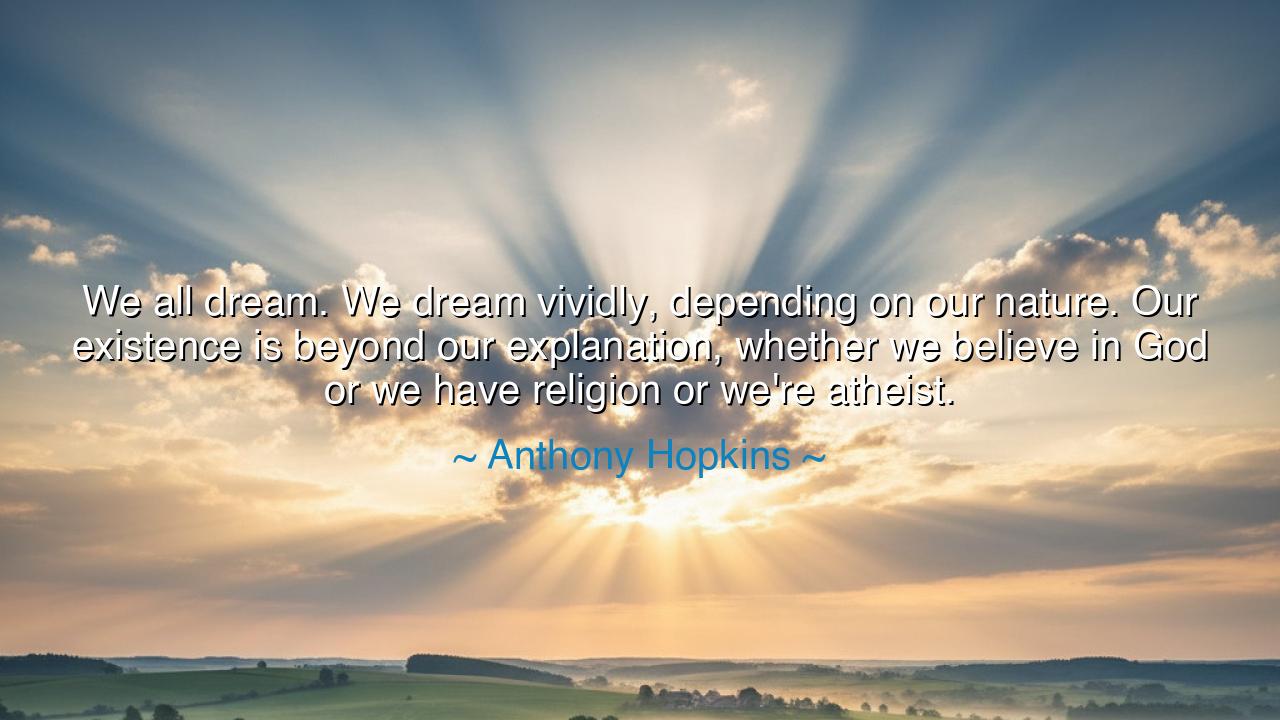
We all dream. We dream vividly, depending on our nature. Our
We all dream. We dream vividly, depending on our nature. Our existence is beyond our explanation, whether we believe in God or we have religion or we're atheist.






In the vast expanse of human experience, dreams serve as a bridge between the known and the unknown, the tangible and the ethereal. As Anthony Hopkins so wisely reflects, "We all dream. We dream vividly, depending on our nature." Dreams, in their myriad forms, reveal to us the depths of our souls, the desires and fears that reside deep within us, beyond the reach of our conscious minds. They offer a glimpse into a world that transcends the confines of our waking lives, a realm where impossibilities become realities, and where the rules of time and space hold no sway. To dream is to touch the divine, to step beyond the boundaries of human limitation, to enter a place where the soul can roam free.
In the ancient world, dreams were often seen as messages from the gods—visions that guided, warned, or inspired. The Greeks and Romans believed that their dreams were channels through which the divine communicated with mortals. Artemidorus, the ancient Greek dream interpreter, wrote extensively on the subject, offering insight into how dreams could shape destinies and reveal hidden truths. In the Iliad, Homer speaks of Achilles receiving divine guidance through his dreams, showing us that dreams were not merely personal fantasies but part of a grand cosmic design. For them, as for us, dreams were seen as a glimpse into something greater, beyond our understanding, a place where human nature met the divine.
Hopkins’ words also touch upon the profound mystery of existence. Whether we are theists, atheists, or somewhere in between, our existence remains beyond full explanation. The ancient philosophers, from Socrates to Plato, pondered the nature of being, the essence of life, and the purpose of the universe. Despite all their wisdom, they too were left with a sense of awe at the mystery of existence, for there are questions that no mortal can fully answer. Socrates famously declared, "The only true wisdom is in knowing you know nothing." His admission of ignorance was not a sign of weakness but a profound humility, recognizing that the ultimate nature of life is elusive, beyond the grasp of even the greatest minds.
The story of Siddhartha Gautama, the Buddha, offers another example of the search for meaning beyond explanation. Born into a life of luxury, Siddhartha was haunted by the deep existential questions of suffering, death, and existence. His awakening was not an answer in the traditional sense but a realization that life itself, in its impermanence and mystery, could be understood not through rigid belief or intellectual mastery, but through experience. In his meditations and eventual enlightenment, the Buddha came to understand that the true essence of life lies not in trying to control the mysteries of the world, but in accepting them and living in harmony with the flow of existence.
In Hopkins’ statement, there is a call to embrace this mystery. Whether we believe in God, follow a particular religion, or reject belief altogether, we are all bound by the same human condition. We are creatures of wonder, seeking answers to questions that may never be fully answered, trying to make sense of a universe far larger and more complex than we can comprehend. Yet, in this pursuit, it is not the certainty of answers that gives life meaning, but the courage to live within the mystery. To dream, to seek, to question—that is what defines us as human. It is not the answers we find, but the journey itself that leads us toward understanding.
The lesson of Hopkins’ quote is that in our pursuit of meaning, we must recognize the universal nature of human experience. Dreams, beliefs, and questions—these are the common threads that bind us all, regardless of our individual paths. Whether we are guided by faith or reason, our existence remains a mystery, one that we must approach with both humility and curiosity. To live fully is to embrace the unknown, to seek understanding, and to remain open to the answers that may come, even if they are fleeting or partial.
In our daily lives, let us take Anthony Hopkins’s wisdom to heart. Let us embrace our dreams, not as mere distractions, but as profound expressions of our nature and our soul. Let us walk with the humility of the ancients, acknowledging that our journey is not toward finding definitive answers but toward experiencing life in all its complexity and mystery. Whether we believe in a higher power or see the universe as a grand accident, let us find peace in the uncertainty, for it is in the very act of living and dreaming that we find meaning. In this way, we honor the sacred mystery of existence, and in doing so, we come closer to understanding the true essence of who we are.






AAdministratorAdministrator
Welcome, honored guests. Please leave a comment, we will respond soon